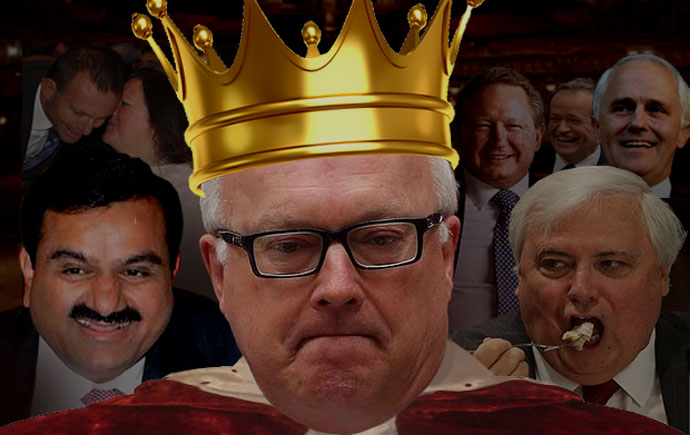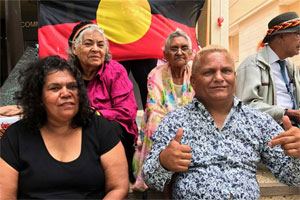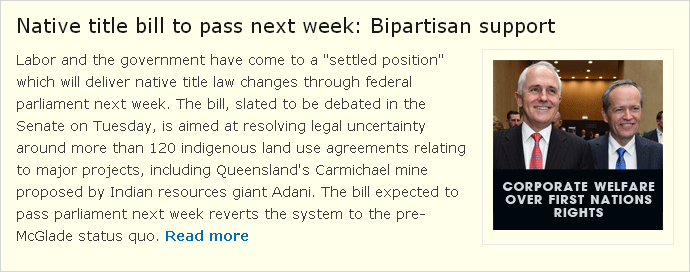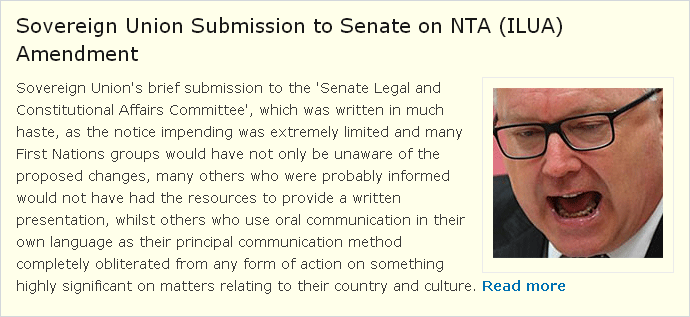Block Native Title Amendment (Indigenous Land Use Agreements) Bill 2017

King of Racism, George Brandis, Attorney-General

Ghillar, Michael Anderson, Convenor of the Sovereign Union
16 February 2017
There is a grave concern that the national parliament will accept the bleeting of the racist fear mongers who run immediately to the king of racism, George Brandis, Attorney-General, to amend the Native Title Act, so as to secure the interests of the multi-national and trans-national corporations and the unscrupulous ecocidal irrigators and farmers, who are well represented in Brandis’ personal constituency from towns like Tamworth, Gunnedah, St George and Dirrinbandi.

Enlarge
The Adani Wangan-Jagalingou ILUA is also deemed invalid due to the McGlade decision.
Native Title Amendment (Indigenous Land Use Agreements) Bill 2017 was read for the second time yesterday 15 February 2017 - see Hansard extract below.
The Bill to amend the Native Title Act in relation to Indigenous Land Use Agreements (ILUAs) is indeed one of the vilest racist acts we have seen, after the Native Title Act itself. It truly represents that the Coalition government and the conservative Labor party govern for the non-Aboriginal society with little or no concern for inherent Aboriginal rights and this is despite years of condemnation by the United Nations Human Rights Commission and other treaty bodies such as the CERD, Committee for the Elimination of Racial Discrimination.
We cannot accept any further adverse changes to the Native Title Act, because the John Howard’s 10 Point Plan facilitated a repression and smothering of our inherent legal rights as the true land owners of this continent. After the 1993 Native Title Act was passed, the late Nugget Coombs condemned the Keating Labor government and its Aboriginal advisors for agreeing to an Act to suppress Aboriginal rights and interests, in favour of ensuring a free pathway of access to Aboriginal lands in right of the multi-national and trans-national corporations, in order to exploit mineral wealth and natural resources without having to pay any fair and equitable compensation and royalty to the rightful owners.

Indigenous Land Use Agreements
Indigenous Land Under Attack
I call upon the Aboriginal members in both upper and lower houses of Federal parliament to stand their ground and not allow the current Native Title Amendment (Indigenous Land Use Agreements) Bill to pass through the Federal Parliament. There can be no compromise on this issue.
This Native Title Act amendment is in fact in complete violation of First Nations’ Law and custom, because each clan makes its own decisions about its own land and what happens on and within those territories. These amendments contribute to the violation of our Law and custom and it shows the belligerent insensitivity of parliament and its sitting members to First Nations Peoples’ Law and custom. We must understand that this amendment provides an insight into why government planning fails when it comes to First Nations and Peoples, and our customs and Laws. The recent Closing The Gap report clearly demonstrates that Australia is failing in respect of addressing a nearly 229-year-old wrongdoing against First Nations Peoples.
I am sure that every Aboriginal group in this country will challenge Attorney-General Brandis’ attempt to crush further our rights and interests. So many of us have not assimilated and know when we are being duped.
We will challenge the validity of these amendments to derogate and abrogate Aboriginal Law and custom. We will not tolerate it. And we expect that the public will support our endeavours to stop once and for all the tyranny of colonial rule, which is ecocidal and genocidal and has no regard for Aboriginal Law and custom.
Related:
Mr KEENAN (Stirling—Minister for Justice and Minister Assisting the Prime Minister for Counter-Terrorism) (09:36):
I move:
That this bill be now read a second time.
Native Title Amendment (Indigenous Land Use Agreements) Bill 2017
Second Reading Speech
The Native Title Amendment (Indigenous Land Use Agreements) Bill 2017 responds to the recent full Federal Court decision in McGlade v Native Title Registrar. It provides certainty to indigenous and non-Indigenous parties alike where they have voluntarily made, or are proposing to make, agreements about the use of land and waters subject to native title.
The effect of the McGlade decision was to overrule an earlier decision of a single judge of the Federal Court in 2010 in a case called Bygrave (No. 2).
Bygrave settled the law in relation to the necessary requisites for an Indigenous land use agreement to be registered.
Bygrave held that it was not necessary for all members of the registered native title claimant (who are the authorised representatives of the broader native title claim group) to be a party to the ILUA.
Rather, Bygrave held that what was important was that the broader native title claim group, being those claiming to hold native title in the area, had authorised the making of the proposed agreement.
The McGlade decision has overturned this position, requiring that all members of the registered native title claimant be a party to the agreement.
This is a very significant development in relation to not only Indigenous land use agreements that have already been registered in reliance on the rule in Bygrave, but in relation to all Indigenous land use agreements seeking registration.
This is because the effect of the decision in McGlade is that the will of the broader native title claim group may be frustrated because not all members of the registered native title claimant have signed the agreement.
This may happen for any number of reasons including that the member of the registered native title claimant does not agree with the decision that the broader claim group has made, or has passed away or became incapacitated before being able to sign the agreement.
These amendments seek to return to the status quo ante as established in Bygrave (No. 2) for agreements that have already been registered or were awaiting registration at the time of the McGlade decision, and which were duly authorised by the broader native title group and which followed the law as it was at the time.
These particular amendments will operate retrospectively to counter the potential impact of the McGlade decision.
The amendments will give primacy to the decision of the broader native title claim group for agreements in the future, as it is the group who claim to hold native title within the area of the agreement who should ultimately have the right to decide whether an agreement should be accepted or not. Greater reliance on collective decision-making reflects the communal nature of native title rights under the act.
The amendments provide that the native title claim group may nominate one or more persons of the registered native title claimant to be a party to the agreement.
The group may also specify a process for determining who will be a party to the agreement. This will guard against the possibility that the person or persons they nominate become unable or unwilling to be a party to the agreement.
If the claim group does not specify a process for determining who is to be a party to the agreement it will be sufficient if a majority of the registered native title claimants are parties. This position is consistent with the recommendations made by the Australian Law Reform Commission in its Connection to country report that the registered native title claimant should be able to act by majority.
To give maximum flexibility to native title claim groups when making these key decisions, the bill also implements recommendations 10-1 and 10-2 of the Australian Law Reform Commission report, by allowing the group to follow a traditional decision-making process if one is available or to agree to another decision-making method. Currently a group must use a traditional decision-making process if one exists.
Taken together, the amendments in this bill will provide certainty to Indigenous and non-Indigenous parties who have already registered their agreements or whose registration is pending. These measures will protect the benefits and interests that have been granted on both sides, and provide certainty for parties who have commenced or are proposing negotiations for an Indigenous land use agreement. The amendments return the control over the realisation of such agreements for Indigenous parties to the hands of the wider group of native title holders, who can ensure that their will is carried out.
Debate adjourned.
 Contact: Ghillar Michael Anderson
Contact: Ghillar Michael AndersonConvener of Sovereign Union of First Nations and Peoples in Australia and Head of State of the Euahlayi Peoples Republic
Contact Details for Ghillar
(*) The proceedings in the High Court for the four members were all under the case name; McGlade v Registrar NTT & Ors. The cases under that name being:
P59/2015 – Mc Glade v. Registrar Native Title Tribunal & Ors
P60/2015 - Eades v. Registrar Native Title Tribunal & Ors
P61/2015 - Smith v. Registrar Native Title Tribunal & Ors
P62/2015 - Culbong v. Registrar Native Title Tribunal & Ors
It is our understanding that the group who formally opposed the 'SWALSC ILUA' and attended the 2014 meetings which triggered the action for High Court cases were: Mingli Wanjurri-Mc Glade (Senior Elder), Mervyn Eades, Naomi Smith, Margaret Culbong (Senior Elder), Benedict Taylor (Senior Elder), Joanne Hayward, Averil Williams, Carl Winmar, Lynette Winmar and Fabian Yarra.



